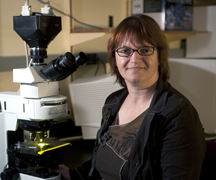Faculty fellow at Discovery Learning Research Center focuses on distance learning in cancer, chronic disease prevention
September 14, 2012
WEST LAFAYETTE, Ind. - The Discovery Learning Research Center is partnering with a Purdue University basic medical sciences professor to advance a research project for interdisciplinary and distance learning based on the prevention of cancer and other chronic diseases.
 |
|
Sophie Lelièvre |
Sophie Lelièvre, the 2012 faculty fellow for the Discovery Learning Research Center and a College of Veterinary Medicine professor, is leading the effort to educate and focus the attention of researchers on the little-studied field of preventative medicine.
"My goal is to develop a learning system across disciplines on primary prevention of breast cancer to facilitate the design of multidisciplinary research projects among scholars and prepare future scholars for interdisciplinary and international work in public health," Lelièvre said.
Lelièvre (pronounced Le-LEE-YEA-vre) believes that primary prevention research is underrepresented in the scientific community. Her proposal for a distance-learning program was intended to correct this by exposing a large number of college science students across many universities to the current state of the research.
Future members of the scientific community are drawn from this pool, so this should result in a greater awareness and representation of this field. Currently, Lelièvre is studying the development and behavior of both normal and cancerous cells, using a three-dimensional culture that permits the architectural mimicry of physiologically relevant tissue.
In particular, this culturing method allows her to study the effect of polarity - the way cells organize themselves to make certain structures face certain directions - on the development of tumors. Her laboratory also examines how the genome of cells is affected by the organization of cell components in the nucleus in relation to tissue architecture.
"Most of those who study cancer use already-cancerous cells for their research. In primary prevention research, you start with normal cells to see how they become abnormal," said Lelièvre, who also is associate director of Discovery Groups for the Purdue Center for Cancer Research.
Lelièvre, who also co-leads the International Breast Cancer and Nutrition Project (IBCN), said this course was piloted in 2010, and she is now working with Purdue anthropology professor Ellen Gruenbaum.
 |
|
Gabriela Weaver |
"This project serves the mission that the Discovery Learning Research Center has set to impact a global community by fostering the development of a large-scale interdisciplinary program focused on breast cancer prevention," said center director Gabriela Weaver.
"It involves many disciplines in the areas of science, technology, engineering and mathematics (STEM), and its goal is to promote learning in public health issues with translational research impact and the potential to influence educational policies across the globe."
Lelièvre and Connie Weaver, distinguished professor of foods and nutrition at Purdue, lead the multinational IBCN to learn more about the role that diet and other environmental factors can play to promote or prevent this disease.
Involving the World Health Organization and the International Agency for Research on Cancer, IBCN is focusing initial efforts on the United States and Ghana as well as France, Japan, Uruguay and Lebanon. Its annual conference returns to the Purdue campus on Oct. 10-12. Lebanon is scheduled to host the 2013 conference. Purdue hosted the inaugural conference in 2010, and France was host in 2011.
Through the project launched in 2010, each country has a dedicated research team focused on a number of milestones and allows scientists to study worldwide diversity in breast cancer rates, dietary patterns and cultural contexts.
A native of France, Lelièvre earned her doctorate in veterinary medicine from the University of Louvain in Belgium in 1990 and her doctorate in cancer pharmacology in 1995 from the University of Paris VI.
Lelièvre, who has been a Purdue faculty member since 2000, also earned a master's degree in law, health and ethics in 2008 from the University of Rennes I in partnership with the School of Public Health in France.
Purdue's Discovery Learning Research Center advances research and innovation that revolutionizes learning in the STEM disciplines. Research involving learning spaces, both physical and virtual, are a cornerstone of activities in the center's new building, the Hall for Discovery and Learning Research.
Since its 2003 launch, the center has catalyzed and collaborated on projects, receiving research funding of nearly $80 million focused on the science of learning, design of innovative educational programs and development of interactive learning technologies. It also leads more than 30 projects involving 180 faculty members from every Purdue college and school and has established collaborations with more than 50 external partners.
Writers: Phillip Fiorini, 765-496-3133, pfiorini@purdue.edu
Danny Burgess, dburgess@purdue.edu
Sources: Sophie Lelièvre, 765-496-7793, lelievre@purdue.edu
Gabriela Weaver, 765-496-3055, gweaver@purdue.edu
Related website:
Discovery Park
Weldon School of Biomedical Engineering
Department of BAsic Medical Sciences

